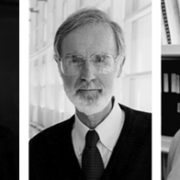2001 – Michael Posner, Marcus Raichle and Steven Petersen
Three pioneers in the field of cognitive neuroscience won the 2001 University of Louisville Grawemeyer Award for Psychology.
The first awarding of the $200,000 prize for outstanding contributions to the field of psychology is to Michael Posner, Marcus Raichle and Steven Petersen, who began collaborating in the mid-1980s to advance the ability to isolate and measure the brain’s mental functions.
Posner is founding director of the Sackler Institute at Weill Medical College of Cornell University in New York City. Raichle and Petersen are professors at Washington University in St. Louis with many academic appointments, including psychology, neurobiology, radiology, neurology and neurological surgery.
The three scientists combined ways to assess mental operations and make images of the brain, a step that led to discoveries of neuroanatomical networks that support language and attention processes.
Their findings continue to affect the study of the brain through imaging. Work in the field potentially could help children with developmental language disorders, attention disorders, dyslexia and other learning disabilities, and adults with schizophrenia, dementia and aphasia.
The Grawemeyer Foundation received 150 nominations for the year 2001 psychology award, including 30 from outside the United States.
About the winners
The founding director of the Sackler Institute for Developmental Psychobiology at Weill Medical College of Cornell University, Michael Posner has been active in psychology’s “cognitive revolution” since the 1960s. He is a psychology professor in the medical college’s psychiatry department.
He received a bachelor’s degree in 1957 from University of Washington and a doctorate in 1962 from University of Michigan. His early research applied information processing theory to memory and skilled performance and led to his 1978 book “Chronometric Explorations of Mind.”
Neuroimaging allowed Posner a chance to test his ideas and resulted in his collaboration with Raichle and Petersen. Many major publications stemmed from this cooperative venture, including the acclaimed 1994 book “Images of Mind,” written with Raichle.
Posner’s honors include the American Psychological Association’s 1980 Distinguished Scientific Contribution award and the American Association for the Advancement of Science’s 1998 John T. McGovern Medal.
Marcus Raichle co-directs the radiological sciences division of the Mallinckrodt Institute of Radiology at Washington University in St. Louis, where he also is professor of radiology, biomedical engineering, neurobiology, psychology, neurology and neurological surgery.
He graduated from the University of Washington School of Medicine in 1964 and specialized in neurology. He has been at Washington University in St. Louis since 1972.
Considered a pioneer in functional neuroimaging, Raichle has done research involving multiple neurological and psychiatric disorders. He has used many imaging tools, including positron emission tomography, regional cerebral blood flow and functional magnetic resonance imaging.
Among his honors are the 1992 Decade of the Brain Medal from the American Association of Neurological Surgery and the 1998 Karl S. Lashley Award from the American Philosophical Society.
Steven Petersen is chief of the School of Medicine’s neuropsychology division at Washington University in St. Louis, and he has additional appointments in neurology, radiology, neurobiology, neurological surgery and psychology.
He received his bachelor’s degree from University of Montana in 1974 and his doctorate from California Institute of Technology in 1982.
Through his laboratory at the university’s Mallinckrodt Institute of Radiology, Petersen has focused on human neurobiology, particularly the assessment of mental operations using positron emission tomography and functional magnetic resonance imaging.
Petersen is known for his studies of word recognition processes using those technological tools and for his work on attention and learning processes.
Download a high resolution version photo of Michael Posner



